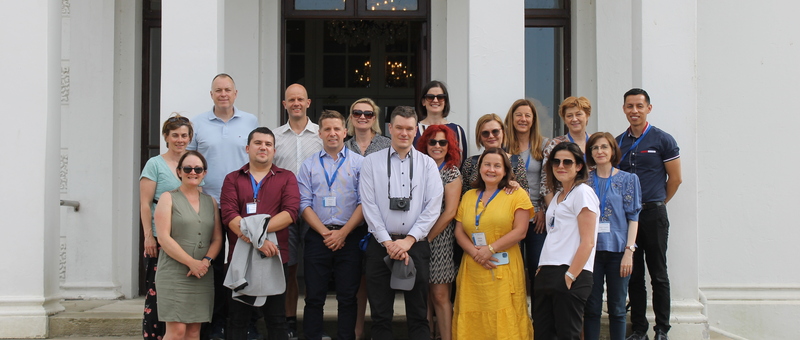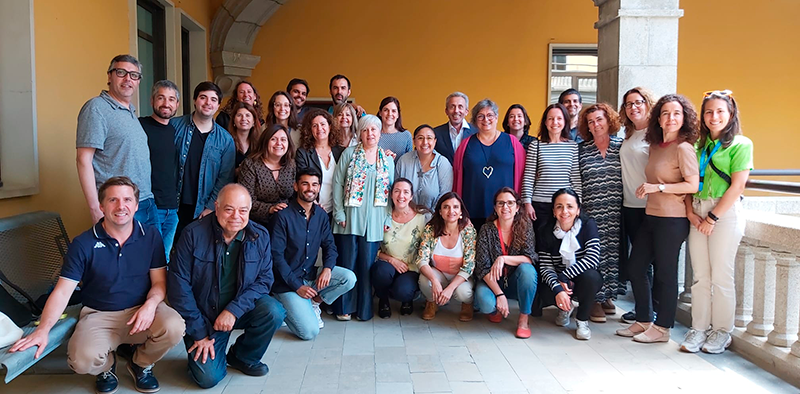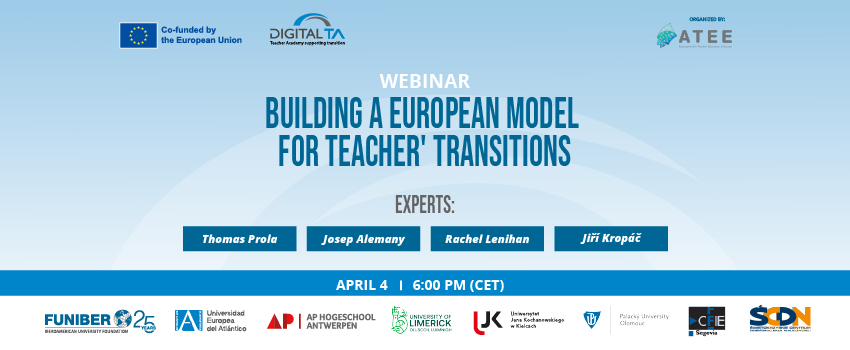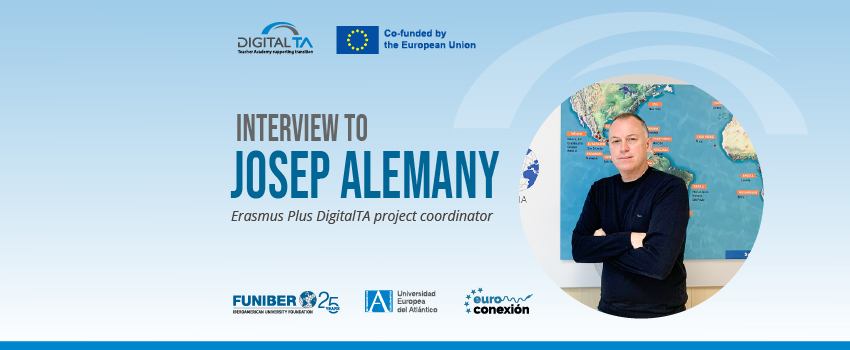The first days of our transnational meeting have allowed us to contribute and exchange ideas. The opening day, in a warmer-than-normal Ireland, began with a welcome session by Jennifer Hennesy, assistant dean of internationalization, and Paul Conway, professor of initial teacher education.
Continue reading “Exchange of ideas and experiences: our meeting in Limerick”Author: Ruth Congregado
Presentation of the DigitalTA project at the University of Barcelona (UB)
Thomas Prola, Project Manager at FUNIBER, spoke on May 9 at the Teaching Conference “Teaching collaboration in the processes of innovation and improvement of university teaching” organized by the Department of Didactics and Educational Organization (DOE) of the University of Barcelona (UB) to publicize the Erasmus Plus DigitalTA project among teachers of the Spanish institution.
Read more: Presentation of the DigitalTA project at the University of Barcelona (UB)The professor and researcher explained the latest advances of the European initiative, led by the Universidad Europea del Atlántico (European University of the Atlantic) (UNEATLANTICO).
The day also included the participation of several teachers from the department who presented various innovative experiences based on cooperation among the teaching staff.
Also present at the session was the Institute for Professional Development (IDP-ICE) of the University of Barcelona, a center of the institution at the service of the professional development of the different groups of the educational world, in all its dimensions and tasks.
The Erasmus Plus DigitalTA project (2022-2025) aims to improve the practical education of teacher training students and young teachers in European Union countries, reducing professional attrition when transitioning between learning to teach and teaching to learn.
The project proposes the development and validation of a European approach based on a digital platform for the support of the teaching practice to facilitate the transition from theory to practice.
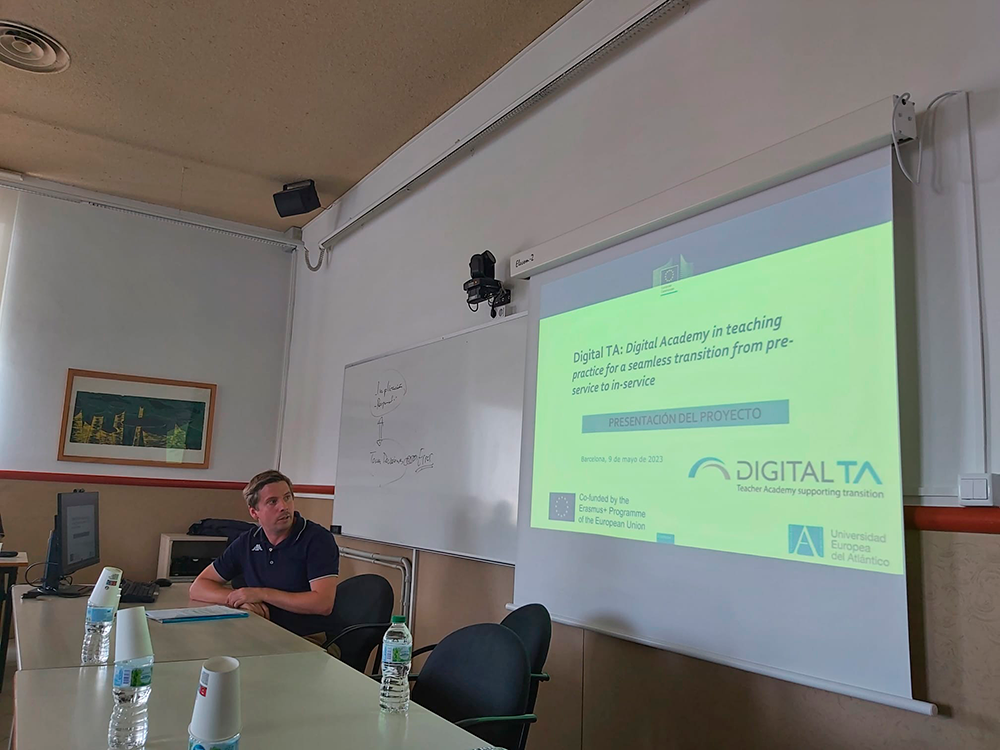
UNEATLANTICO meets with the Department of Education of Cantabria to discuss possible collaborations in the DigitalTA project
Josep Alemany and Thomas Prola, responsible for the Erasmus Plus project DigitalTA (2022-2025), met last April 26th at the campus of the Universidad Europea del Atlántico (European University of the Atlantic) (UNEATLANTICO) in Santander with Guillermo González, Chief of the Technical Unit of Evaluation and Accreditation of the Department of Education, Vocational Training, and Tourism of the Government of Cantabria, to discuss possible cooperation strategies.
Read more: UNEATLANTICO meets with the Department of Education of Cantabria to discuss possible collaborations in the DigitalTA projectAt the meeting, the result of the collaboration agreement between the General Directorate of Innovation and Educational Inspection of the Department of Education, Vocational Training, and Tourism of Cantabria and UNEATLANTICO analyzed the current status of the project and reviewed the various lines of joint action for the proper development and implementation of the project, in which current and future teachers in Cantabria will have a prominent role.
To this end, different activities will be carried out to disseminate and publicize the project, and the professionals targeted by this initiative will be involved in different processes:
On the one hand, primary and secondary school teachers recently graduated and incorporated to an educational center will participate in the design of the digital tools and in the pilot experiences of the project. Students of the Teacher Training Degree and Master in Teacher Training will also play an important role, collaborating in the review and co-design process of the digital tools, as well as in the pilot training sessions.
In addition, Higher Education teacher trainers will be invited to participate in the practical training and, especially, in the tutoring of the teacher training students who will participate in the design process of the new tutoring and mentoring tool. In addition, experienced teachers and mentors from primary and secondary education, in charge of young teachers and with tutoring responsibilities in their schools, will be invited to collaborate during the pilot learning activities. Finally, participation in the pilot experiences and the development of the platform will be offered to official teacher training organizations.
The project aims to improve the practical education of teacher training students and young teachers in European Union countries, curtailing professional attrition when transitioning between learning to teach and teaching to learn.
DigitalTA project partners participate in a webinar to analyze the first results
Project partners will participate on April 4 at 18:00 hours (CET) in the webinar “DigitalTA: Building a European model for teacher transition.”
Organized by the Association for Teacher Education in Europe (ATEE), a partner organization of the project, the event will be attended by Josep Alemany, DigitalTA project coordinator and teacher at UNEATLANTICO; Thomas Prola, Project Manager at FUNIBER; Rachel Lenihan, lecturer at the University of Limerick (UL) in Ireland; and Jiří Kropáč, researcher at the Palacký University of Olomouc in the Czech Republic.
The early research carried out during the first year of the project will be analyzed during the event.
We will first review the shared European experiences regarding the processes of initial and continuous practical teacher training. The report presented by the project partners aims to address the needs of educational challenges around the world, especially in transition, as well as to seek bridges on how to react to needs in initial preparation, transition, and cooperation among practicing teachers.
The speakers will also focus on another research project aimed at developing a harmonized European model of practical training to provide guidance and support to in-service teachers. The purpose of this report is to present the basis of the reflective model of online guidance and accompaniment for students and education professionals who are in the first years of their professional practice in primary and secondary schools. It is based on a pedagogical approach to meet the needs of teachers beginning their training, taking full advantage of the potential of information and communication technologies.
The event is free of charge. Those interested in accessing the program should register at the following link.
The project’s main objective is to improve the practical education of pre-service and in-service school teachers throughout the countries of the European Union, thereby reducing the number of school dropouts.
The project, led by the European University of the Atlantic (UNEATLANTICO), also counts on the collaboration of different European institutions: Artesis Plantijn University of Applied Sciences (AP), University of Limerick (UL), Univerzita Palackého v Olomouci de Olomouc, Uniwersytet Jana Kochanowskiego w Kielcach, the Segovia Teacher Training Center and the Swiętokrzyskie Centrum Doskonalenia Nauczycieli.
Spanish radio program interviews Josep Alemany, project coordinator
Josep Alemany, the project coordinator and a professor at the European University of the Atlantic (UNEATLANTICO), recently took part in the Spanish radio program Euroconexión, following the agreement between the Association of Spanish University Radio Broadcasters and the European Parliament to discuss the project’s progress.
Selected by the European Executive Agency for Education and Culture among the eleven best projects for the 2021 call for proposals, Erasmus+ DigitalTA (2022-25) is of great importance in the Cantabrian, national and European educational field. This is an initiative co-funded by the European Union that proposes the design and implementation of an open digital resource to improve the transition of studies and practices of student teachers and new teachers. To this end, a learning community has been created where they can find solutions and answers to their day-to-day experiences as teachers.
Throughout the broadcast, Alemany emphasizes that the project’s main objective is to improve the practical training of teachers within the member states of the European Union, before and during the exercise of their profession. The initiative seeks to curtail the dropout rate from teaching professions, one of the many challenges facing education in Europe.
Almany emphasized the lack of student experience at the end of their academic process and offered a message of hope: “If you’ve been lucky enough to develop your skills adequately throughout your undergraduate degree and supplemented it with experience, and you’re also restless and listen to people who want to support you and help you while you’re developing your profession in your early career, you’re going to end up becoming a good teacher.”
It is worth mentioning that DigitalTA is the only project of its kind led by a Spanish university. The initiative, enables collaboration and relations between various institutions and countries, and responds to the European concern on improving the quality of teachers and professors.
If you are interested in the field of education, we invite you to tune in to the Euroconexión episode, which you can listen to via the player below.
The Ministry of Education of Cantabria in Spain, joins the European Erasmus + DigitalTA project
The Ministry of Education of Cantabria (Spain) will collaborate in the Erasmus+ DigitalTA (2022-25) project led by the European University of the Atlantic (UNEATLANTICO) with the participation of multiple European academic institutions.
This collaboration was consolidated after the signing of an agreement by María Mercedes García Pérez, General Director of Innovation and Educational Inspection of the Government of Cantabria, and Josep Alemany Iturriaga, Project Manager of the DigitalTA project and professor at UNEATLANTICO.
The agreement signed at the Regional Ministry is of utmost importance for the project’s successful development, and reflects how well both institutions agree on projects aimed at improving education in Cantabria and the European Community.
It is worth recalling that the Erasmus + DigitalTA project (2022-25) aims to improve the practical education of teacher training students and young teachers in European Union countries, reducing professional attrition when transitioning between learning to teach and teaching to learn.
This collaboration, under the coordination and supervision of the Technical Unit of Evaluation and Accreditation (UTEA), with further collaboration from the Teaching Consultancy responsible for the Development of Digital Competence in Cantabria, will include the dissemination and divulgation of the project’s activities, among other actions. Furthermore, it will involve participation from different stakeholders (graduates, master’s students, professors, etc.) during the design of the digital tools and pilot experiences of the project, review processes and co-design of the digital tools, as well as in the pilot training sessions. Their support will also be available during the design process of the new tutoring/mentoring tool, participation in the pilot experiences, and during the development of the platform.

